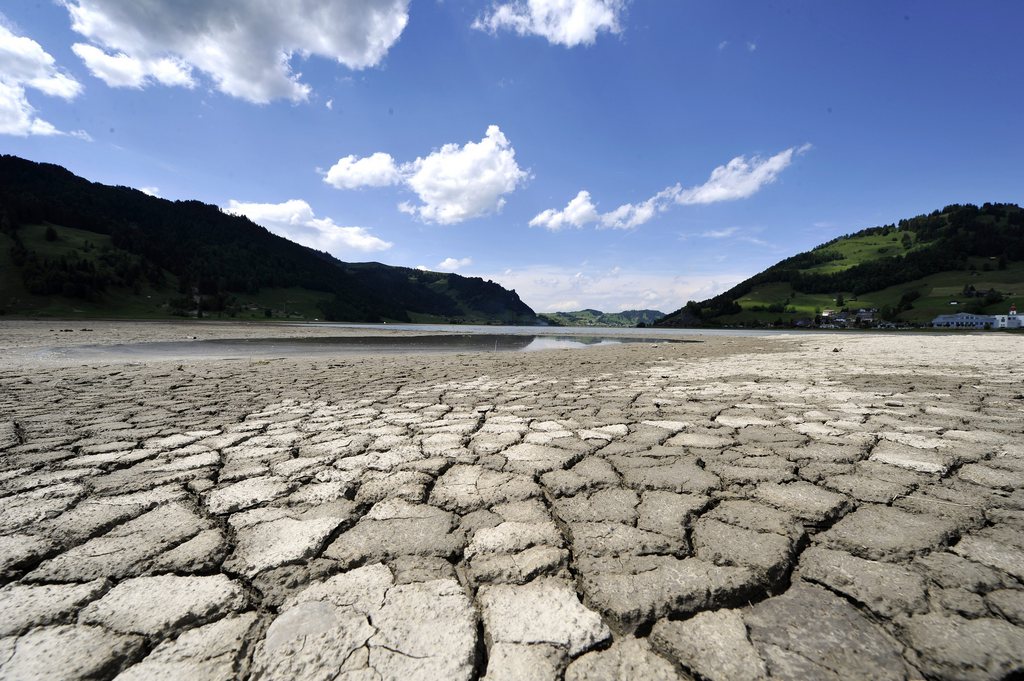Cancun paves way for global climate treaty

Switzerland has welcomed a new United Nations deal thrashed out in Cancun, saying it heralds the birth of an international treaty on climate change.
Over 190 nations meeting in the Mexican resort adopted the two-part climate agreement on Saturday.
The deal, brokered by Mexico, includes the creation of a Green Climate Fund and steps to help share clean technologies such as wind and solar power, protect tropical forests and assist poor nations to adapt to impacts such as floods, droughts and rising sea levels.
The final result offers a “solid basis for development” on issues in the coming years and primarily, for next year’s climate summit in South Africa, Switzerland’s top negotiator Bruno Oberle told swissinfo.ch in Cancun.
A “fairly impressive” list of promises by developed and developing countries had been incorporated in the deal, said Oberle, who heads the Swiss Federal Environment Office.
The current climate treaty is now 20 years old, and no longer reflects today’s global emissions situation, he said. It was time to find a way of bringing developed and developing countries together to take responsibility for their share in the bigger climate picture.
Cancun has taken a step in that direction with a document that “provides one overarching framework for all countries”.
The same sentiment was expressed by the president of conference of the UN Framework Convention on Climate Change, Mexican Foreign Secretary Patricia Espinosa, who announced the conclusion of the agreement saying the “historic” deal signaled “a new era in international cooperation in climate change”.
The European Union’s climate commissioner Connie Hedegaard, also commented that Cancun “proved that multilateralism can create results”.
“Step backwards”
Draft texts were formally endorsed at a final session at 4am local time, after non-stop negotiations among delegations through Thursday and Friday. It passed despite solitary opposition from Bolivia.
The South American nation said it was opposed to the deal as it represented a “step backwards” and would result in a “weaker, less demanding, regime for developed countries which are responsible for global warming”.
Mexico said Bolivia’s objections were “duly reflected in the conference records”.
Bolivia was criticised during the week for its hardline approach, the toughest of any nation at the talks, demanding that rich nations halve their greenhouse gas emissions by 2017 from 1990 levels – far beyond the demands of other nations.
A new fund
The Cancun agreement was the first time in three years that the 193-nation conference had adopted any climate action, restoring faith in the UN process after failed talks in Copenhagen in 2009.
The deal integrates the pledges for action made in the Copenhagen Accord into the UN climate process. But it does not require developed countries to adopt binding cuts beyond the Kyoto Protocol, which runs out in 2012.
Delegates put off the Kyoto issue until next year’s conference in South Africa, but states party to the protocol will be obliged to intensify their efforts to reduce greenhouse gas emissions.(Switzerland’s commitment for a second Kyoto period from 2013- 2020 is currently before the Swiss parliament.)
In creating a new climate fund, richer nations have promised to contribute $100 billion a year by 2020, but the Cancun decision does not identify specific sources of financing. The fund will be used to help developing nations obtain clean technology and adapt to climate change.
Switzerland noted that it helped push through with the climate fund with a proposal on how it should be organised, and through its staging of the Geneva Dialogue on Climate Finance earlier this year.
Great challenge
Oberle said Cancun also helped answer a key question about the climate issue, namely, “who is responsible for what in the field of mitigation” of the effects of environmental changes.
He was referring to the planned framework of measures aimed at helping in particular the very vulnerable developing countries to adapt to climate change and to mitigate its impact on them. (See Cancun deal highlights).
The deal also takes a position on climate change, saying it is one of the greatest challenges facing humanity and calling for a paradigm shift to enable the development of a climate-friendly economy and society.
Outside the plenary session, Patrick Hofstetter, spokesman for the Swiss Climate Alliance, told swissinfo.ch he was satisfied with the outcome, but noted it was “just one important step”.
On a positive note, no issues were left out of the Cancun agreement, but the deal was problematic as most of the processes decided had no clear end date nor was it obvious how they would evolve, he said.
“So it’s very open whether we will have something in one, three or five years. This is a big problem so it needs a lot of work next year in order to finalise everything in South Africa.”
Observing the Cancun summit from Switzerland, Oberle’s predecessor, Philippe Roch, now an environmental consultant, noted that trust between nations had been restored during the negotiations, which was in itself a “very positive factor”.
“After Copenhagen there were huge doubts about whether countries could work together. Trust is necessary,” he said, cautioning however that “we have not yet reached a paradigm shift in our consumer behaviour or attitudes about carbon usage.”
GREEN CLIMATE FUND
To establish a Green Climate Fund to support developing nations in obtaining clean energy technology to reduce greenhouse gas emissions, and to adapt to potentially damaging climate change. Richer nations have promised $100 billion a year by 2020, but the Cancun decision does not identify specific sources of financing
DEFORESTATION
To promote efforts in poorer nations to protect their climate-friendly tropical forests, with the prospect of financial compensation from richer nations. The final text had compromise language on financing, monitoring and oversight, requiring further negotiation.
TECHNOLOGY TRANSFER
To establish a Technology Committee under the treaty to analyse technology needs and policies for developing nations for clean energy and adaptation to climate change, and a Climate Technology Center to build a global network to match technology needs and suppliers.
‘ANCHORING’ PLEDGES
To inscribe in UN conference documents the voluntary pledges made by some 80 nations under the 2009 Copenhagen Accord to rein in their greenhouse gas emissions. The decision also urges developed nations to “increase the ambition” of those targets.
MONITORING PLEDGES
To strengthen the reporting requirements and review of emissions-reduction actions by both developed and developing countries, to verify they are being carried out effectively. Developed nations also would improve reporting on climate-related financial support to poorer nations.
The UN Climate Change Conference was held in Cancun, Mexico, from November 29-December 10. The negotiating process revolved around sessions of the signatory parties to the UN Framework Convention on Climate Change (UNFCCC), which meet annually to review how the convention is being implemented.
Talks included the issues of adaptation, reducing greenhouse gas emissions, climate finance, and the future of the Kyoto Protocol, which expires in 2012.

In compliance with the JTI standards
More: SWI swissinfo.ch certified by the Journalism Trust Initiative














You can find an overview of ongoing debates with our journalists here . Please join us!
If you want to start a conversation about a topic raised in this article or want to report factual errors, email us at english@swissinfo.ch.